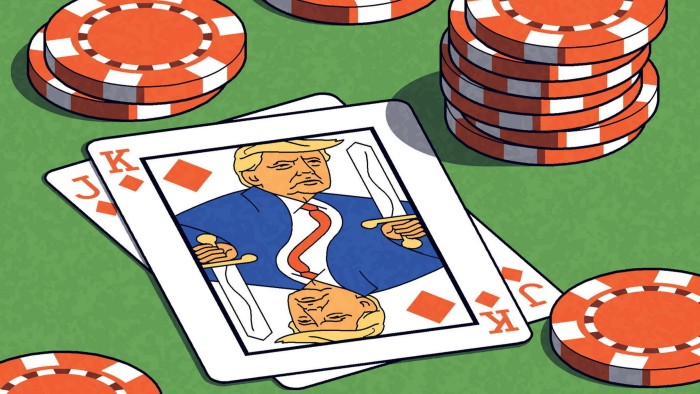Unlock the White House Watch newsletter for free
Your guide to what the 2024 US election means for Washington and the world
Donald Trump isn’t even president yet, but the world is already locked into a dysfunctional dance with him. Headlines herald the beginning of his tariff war while pundits prognosticate about all the disastrous things that will follow as a result.
But most of these analyses fundamentally misinterpret the president-elect and his “policies”. Trump is not a policymaker. He’s not actually even a protectionist (that would require a political belief system). Neither is he a true nationalist (ditto). He’s an opportunist.
If you think of the global economy as one giant Las Vegas gaming table, the US consumer market as the world’s most valuable chip and Trump as a wily deal maker in a high-stakes poker game, then you will better understand what the next four years might look like.
For starters, let’s remember that nothing — and I mean nothing — that the next US president says can be counted as fact until the ink is dry — and if history is a guide, probably not even then. We keep trying to analyse Trump’s moves in the way we would those of a normal president. But he is not a normal holder of the office, and never will be. He is a compulsive dealmaker, someone who loves to drive a hard bargain and win — or at least appear to.
This is the true context for the new tariffs Trump promised last week on Mexico, Canada and China.
Think of the move not as some clear sign of America First protectionism, nostalgia for manufacturing, the opening salvo in a well-planned industrial policy, or even any real concern about illegal immigration across US borders or opioid-addicted Americans receiving fentanyl via ecommerce packages from China.
Think of it instead as a game that Trump needs to win. If you accept this, then you can start to look at his tariff gambits in a different way. The tariffs against Mexico and Canada, for example, might be thought of as a round of Texas Hold’em.
In that version of poker, the stakes are clear and high. Illegal immigration and drug trafficking across the southern and northern borders of the US is a big issue for Trump’s base, and he will probably be able to make some quick political gain in the form of promises around better enforcement.
Trump will hold up any small concession by either country as a victory, but there’s another message being sent here as well. The tell is his addition of China to the tariff mix at this particular moment.
Yes, Chinese-produced fentanyl coming through Mexico into the US is a real thing. But the bigger issue is that as supply chains continue to realign globally, China has been using Mexico as a way into the American consumer market, something that the trade protectionists and China hawks in the current administration would actually like to crack down on.
In this way, the tariff announcement might be seen as the first card laid down in a round of five-card draw, a poker game in which there are multiple rounds of betting and nobody knows the full hand of any one player until the very end. America’s closest neighbours have been put on anxious notice about what may come — perhaps a renegotiation of the United States-Mexico-Canada Agreement? — which is always a good poker strategy.
If there was such a renegotiation, some of the most affected industries would be steel, energy and automotive. So, tariff threats directed at Mexico and Canada may be just the first card being laid down in a longer global game over automotive supply chains, both conventional and clean.
German carmakers, for example, must know that auto tariffs may well be used as a cudgel to try and loosen political relations with Beijing and encourage allies to embrace the American approach to dealing with Chinese mercantilism.
Germany and other European countries also know that the next card to fall could be the threat of broader tariffs on the EU as a way to force the bloc to increase spending and self-sufficiency in security and defence. Trump has no real interest in the fate of Ukraine, and apparently no worries about being perceived as caving into Russian president Vladimir Putin. But he’s also been dealt a tough card in this round: inflation. Tariffs on high-value European goods would cause an inflationary bump that would be felt right away. So, when it comes to Europe, Trump’s bluffs may not work.
His trickiest gamble will, of course, be with China. There, he’s playing a different game altogether — that of Mahjong, in which complex strategies and numerous hand variations make it difficult to master, let alone win. While tariffs on China may be less inflationary than those on Europe, there are deeply entangled supply chains to grapple with, as well as the divide in his own cabinet between business-friendly Wall Street cabinet appointees and the more protectionist Maga crowd.
Finally, there’s the question of Taiwan. Trump hates foreign wars, but he also can’t bear looking weak. After the election in November, Beijing took to calling Taiwan an “orphan” nation, the kind of taunt Trump hates. But war in the South China Sea would be a disaster for everyone involved, economically and politically.
Get ready for four years of high-stakes geopolitical poker.
Source link









